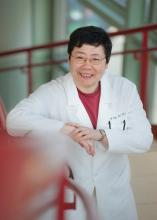The center will support a multi-investigator research team focused on discerning the role of the tumor microenvironment in breast cancer progression.
Ruth Keri, PhD, staff in the Department of Cancer Biology and associate director for basic research at the Case Comprehensive Cancer Center, and Charis Eng, MD, PhD, chair of the Genomic Medicine Institute, have received a two-year, $400,000 grant from Cleveland Clinic to establish the Cleveland Clinic Breast Cancer Center of Excellence, which will advance breast cancer research.
Breast cancer is the most commonly diagnosed cancer worldwide, and also disproportionately impacts patients in Cuyahoga County with new cases occurring more frequently compared to other Ohio counties and the United States. While treatment advances have improved survival rates, breast cancer is a highly complex disease that differs greatly between patients as well as within individual tumors, underscoring the need to identify factors controlling disease progression and therapeutic resistance.
“While the ecosystem surrounding a tumor, or the tumor microenvironment, is known to contribute to cancer progression and the differences observed in patient outcomes, further investigation is needed to fully elucidate the tumor microenvironment’s role and inform clinical management,” said Eng. “With this grant, we will build a research team that will advance the understanding of how the tumor microenvironment modulates breast cancer progression.”
The center’s research team will be co-led by Drs. Keri and Eng and will include Jennifer Yu, MD, PhD, staff in the Department of Cancer Biology, and Lily Wang, PhD, associate staff in the Department of Translational Hematology and Oncology Research; all are members of the Case Comprehensive Cancer Center. The four investigators have established research programs focused on understudied aspects of the breast cancer tumor microenvironment with ongoing projects examining the bidirectional communication between breast cancer cells and the extracellular matrix, microbiome, nerves and immune system.
“Our aims are to discover how the breast tumor microenvironment promotes disease progression and metastasis, develop state-of-the-art technologies that support our work and generate new models of understudied forms of breast cancer,” said Keri. “Importantly, we will emphasize analyses of Cleveland Clinic patient samples to ensure the relevance of our discoveries to Cleveland patients as well as the larger community.”



